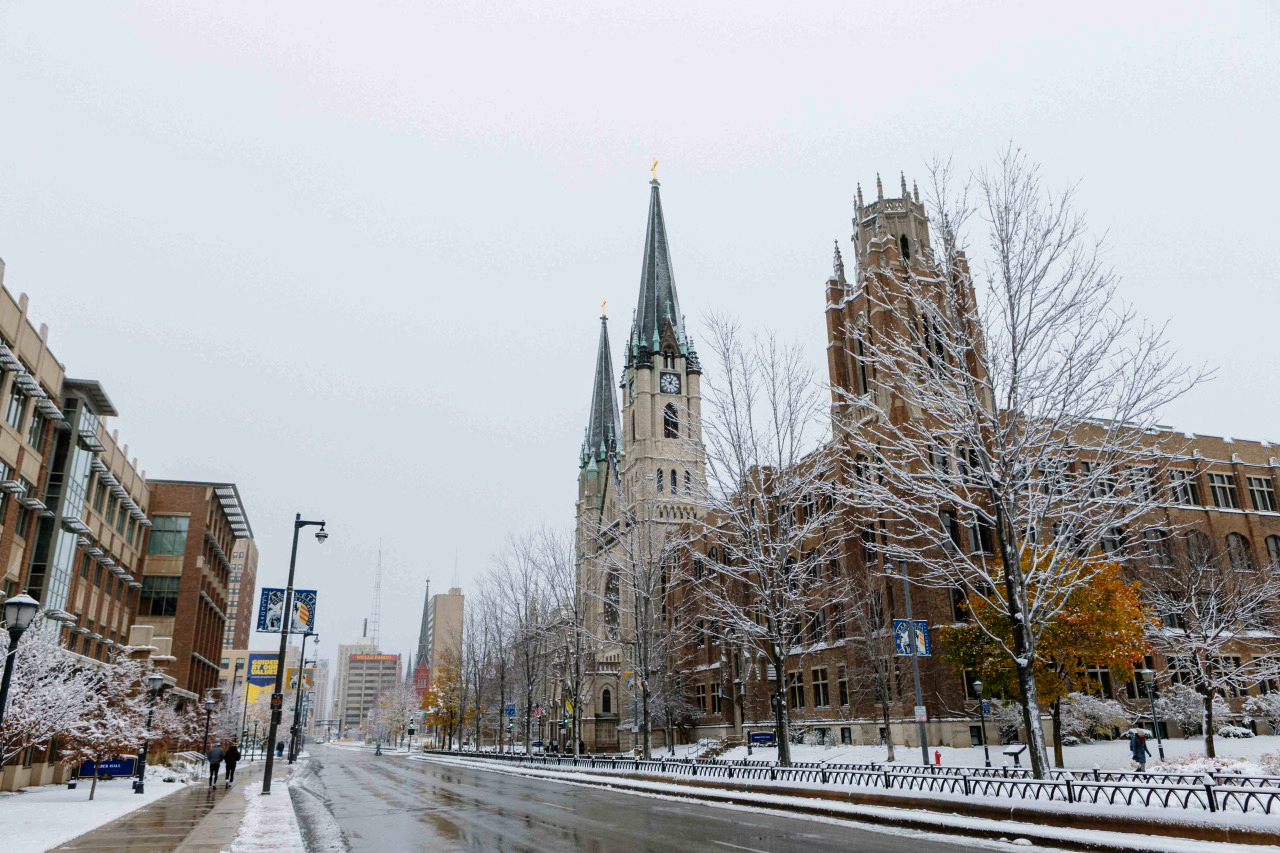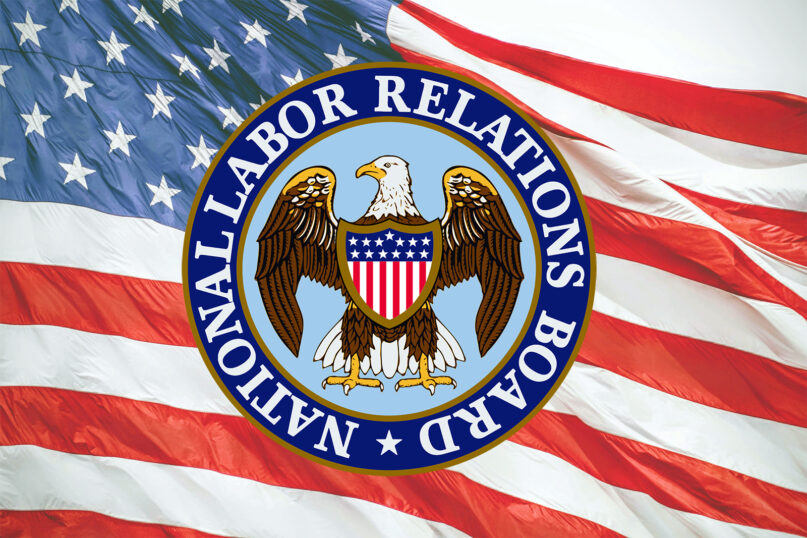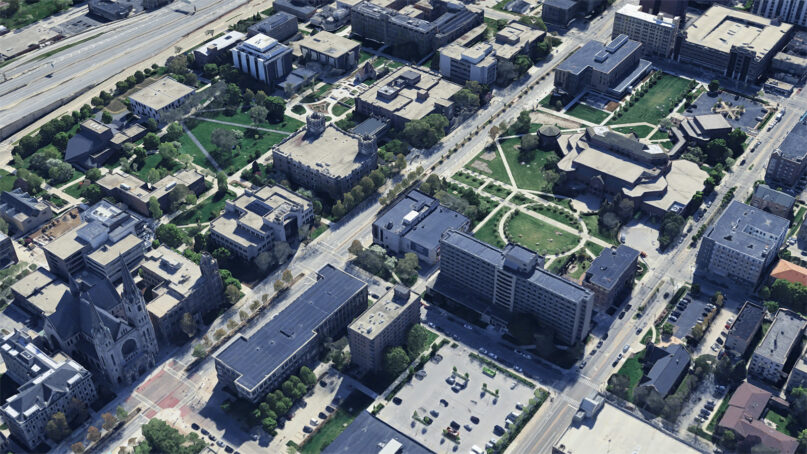
(RNS) — Non-tenure-track faculty at Marquette University, a Jesuit school in Milwaukee, had been working for months to unionize and were preparing for a National Labor Relations Board-sanctioned election to join the United Campus Workers of Wisconsin when, in October, their employer invoked a religious exemption to quash their efforts.
Giordana Poggioli-Kaftan, a non-tenured faculty member who directs the Italian program, and a Catholic, was bewildered. “ I don’t understand how that is possible,” she told RNS. Not only had other Catholic institutions already unionized, but papal teachings stretching over a century promote unions.
A September 2024 report by the Catholic Labor Network listed more than 20 Catholic universities in the United States that have some type of faculty union, representing less than 10% of U.S. Catholic higher education. In the last 15 years, at least eight Catholic universities have invoked religious exemptions to avoid recognizing unions that include faculty or graduate students.
The move has become easier in recent years, since the requirements to receive an exemption from the NLRB only stipulate that the university be nonprofit, present itself as religious and have a religious affiliation.
Religious exemptions to the 1935 National Labor Relations Act, which gave employees the legal right to form and join unions, have been worked out ever since in federal court cases and the NLRB rulings that have often turned on which employees were eligible for an exemption.
From 2014 to 2020, the NLRB used a higher standard, requiring that the NLRB only had jurisdiction where faculty were involved in “performing a specific religious function.” That standard was dropped when the NLRB decided that determining whether faculty were performing such functions would require “impermissibly intrusive” inquiries that would in themselves violate the First Amendment.

The National Labor Relations Board was established in 1935. (Courtesy image)
“ This low standard gives all the power to the institution to pick and choose as to how it wants to proceed,” said William Herbert, executive director of the National Center for the Study of Collective Bargaining in Higher Education and the Professions at Hunter College in New York City.
Since the change, two Catholic universities, Saint Leo University in Florida and Chicago’s Saint Xavier University, have used the new standard to dissolve faculty unions that were over 40 years old.
The Catholic Church has long supported unions at least since Pope Leo III’s 1891 encyclical, “Rerum Novarum,” which the U.S. bishops reaffirmed in their 1986 pastoral letter, “Economic Justice for All,” saying, “No one may deny the right to organize without attacking human dignity itself.”
Matthew Shadle, a moral theologian, and Charles Russo, a Catholic legal scholar at the University of Dayton, called anti-union positions at Catholic universities “hypocritical,” given Catholic teaching, and Meghan Clark, a Catholic moral theologian at St. John’s University in Queens, New York, said Marquette is exercising “the right to violate its own religious principles and tradition.”
Clayton Sinyai, executive director of the Catholic Labor Network, an organization with offices at Georgetown University promoting Catholic social teaching on unions, said that today Catholic leaders of higher education are trained to avoid unionization, saying administrators “are formed not in Catholic doctrine but in schools of management, business and administration which counsel ‘union avoidance’ — or in plain language, union busting.”
Claiming protection from unions under the First Amendment, he said, communicates “that they are too Catholic to be subject to the civil law, but not Catholic enough to honor Catholic social teaching voluntarily, of their own accord.”

A satellite view of Marquette University in Milwaukee, Wisconsin. (Image via Google Earth)
A Marquette spokesperson, Monica MacKay, said in a statement that an existing faculty task force can serve the school better than a union: “Continuing our strong partnership with faculty and staff — without needing to engage the union as an outside third party that may not share our same values — is the best way to deliver our Catholic, Jesuit mission and serve our students.”
But Grant Gosizk, who teaches English at Marquette, said the task force has not fixed what he called the most dire problems for non-tenured faculty: low wages, short contracts and the lack of protection for taking time off for parental or sick leave. “We struggle to take care of our children,” Gosizk said. “People struggle to take care of the elders in their families,” and “ they struggle to pay rent.”
Organizers say faculty are paid as little as $43,000, below the living wage in Milwaukee for parents in any type of household, according to Massachusetts Institute of Technology’s Living Wage Calculator.

Giordana Poggioli-Kaftan. (Photo via Marquette University)
Twenty-two years of service at Marquette has bumped Poggioli-Kaftan up to $53,000 – essentially the starting salary for a high school teacher in Milwaukee Public Schools. “ It seems like there’s never money for us,” Poggioli-Kaftan said. “There’s money, of course, for buildings.”
Sam Harshner, who teaches political science, said he understood human dignity to be at “the core” of Christianity. “I don’t think that full-time, non-tenure-track faculty are treated with a great deal of dignity. We’re often treated as disposable, often treated as if we don’t matter,” said Harshner, an Episcopalian. “ We are always at the bottom of the list of priorities.”
Marquette spokespeople did not respond to multiple requests to interview university President Kimo Ah Yun about how he reconciled the university’s position with Catholic theology on unions.
Officially, the Association of Catholic Colleges and Universities “does not take a position on unionization, it supports its members as private, religious institutions who choose to be exempt from rules governing the formation of faculty unions,” according to a statement sent by MacKay.
Donna Carroll, who heads the ACCU, said in that statement that she hoped Catholic universities “will resolve their differences internally — and with mutual respect.” After an initial response, her office did not respond to multiple requests to make her available for an interview.
A model for a mutually respectful arrangement that preserves religious independence, said Herbert, the Hunter College expert, is voluntary recognition, in which administrators recognize a union while remaining independent of NLRB oversight. After agreeing to negotiate, the administrators and union members could select a mutually agreeable panel of arbitrators to resolve any disputes.
Russo, the University of Dayton legal scholar, sees a way unions and universities can preserve religious freedom by separating religious and nonreligious matters. “ In bargaining, it’s easy enough to separate lay issues, if you will, from religious issues,” Russo said. “Salary and benefits are lay. Observing church teaching by not having extramarital relations is a religious matter.”
None of the six Jesuits on the Marquette board of trustees responded to RNS’ inquiries about the union decision, nor did the Rev. John Thiede, vice president for mission and ministry.
The Rev. Daniel McDonald, who leads the Jesuit USA Midwest Province’s work on higher education, told RNS by email he had not been brought into discussions about a potential union, but he planned to ask about the issue during his next formal visit. The Association of Jesuit Colleges and Universities declined multiple requests to make its president, the Rev. Michael J. Garanzini, available for comment.
Some Jesuits on Marquette’s campus did express reservations about the university’s anti-union stance. The Rev. T. Michael McNulty, scholar-in-residence at the Center for Peacemaking, and the Rev. Gregory O’Meara, rector of the university’s Jesuit community, told RNS in a statement, “We think it useful to recall the basic tenets of Catholic social teaching as it applies to labor unions,” and quoted pro-union teaching in the Catholic Catechism, a Second Vatican Council document “Gaudium et Spes” and the USCCB’s “Economic Justice for All” letter.
